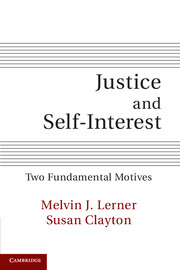Book contents
- Frontmatter
- Contents
- List of Figures and Tables
- Preface
- 1 Contesting the Primacy of Self-Interest
- 2 Why Does Justice Matter? The Development of a Personal Contract
- 3 Commitment to Justice: The Initial Primary Automatic Reaction
- 4 Explaining the Myth of Self-Interest
- 5 Defining the Justice Motive: Reintegrating Procedural and Distributive Justice
- 6 How People Assess Deservingness and Justice: The Role of Social Norms
- 7 Integrating Justice and Self-Interest: A Tentative Model
- 8 Maintaining the Commitment to Justice in a Complex World
- 9 Bringing It Closer to Home: Justice in Another “American Tragedy”
- 10 Emotional Aftereffects: Some Negative Consequences and Thoughts on How to Avoid Them
- References
- Author Index
- Subject Index
2 - Why Does Justice Matter? The Development of a Personal Contract
Published online by Cambridge University Press: 03 May 2011
- Frontmatter
- Contents
- List of Figures and Tables
- Preface
- 1 Contesting the Primacy of Self-Interest
- 2 Why Does Justice Matter? The Development of a Personal Contract
- 3 Commitment to Justice: The Initial Primary Automatic Reaction
- 4 Explaining the Myth of Self-Interest
- 5 Defining the Justice Motive: Reintegrating Procedural and Distributive Justice
- 6 How People Assess Deservingness and Justice: The Role of Social Norms
- 7 Integrating Justice and Self-Interest: A Tentative Model
- 8 Maintaining the Commitment to Justice in a Complex World
- 9 Bringing It Closer to Home: Justice in Another “American Tragedy”
- 10 Emotional Aftereffects: Some Negative Consequences and Thoughts on How to Avoid Them
- References
- Author Index
- Subject Index
Summary
The recognition of a pervasive and central concern with deservingness and justice in people's lives raises a challenging question: how can one explain why justice imperatives, the commitment to deservingness and justice, have a uniquely central place in peoples' lives? Some have attempted to answer this question by speculating about prehistoric evolutionary events or by extrapolating from the behavior of infrahuman organisms, but a considerably more accessible place to begin the search for the origins of the justice motive in humans is with the normal course of human development as it unfolds in a relatively stable environment. Examining the cognitive capabilities and learning challenges that characterize children as they grow and mature suggests how acquiring a sense of justice can be a standard and important part of development.
DEVELOPING A SENSE OF DESERVINGNESS
As children develop and learn more successful ways of gaining what they want, they typically pursue a more enlightened or rational form of self-interest instead of attempting to directly gratify their desires. This represents a natural transition from being dominated by what Freud (1953) termed the “pleasure principle” to following the “reality principle.” The innate tendency to focus on the immediate gratification of urges is replaced by the use of more indirect and socially sanctioned methods, based on a longer time span, that integrate individual desires with societal expectations and standards.
- Type
- Chapter
- Information
- Justice and Self-InterestTwo Fundamental Motives, pp. 20 - 39Publisher: Cambridge University PressPrint publication year: 2011

